That Christianity gives joy and breadth is also a thread that runs through my whole life. Ultimately someone who is always only in opposition could not endure life at all.
RT - News
Victoria Nuland urges US to make Russian bases ‘fair game’ for Ukraine
Kiev needs permission to use American weapons without restrictions, the veteran diplomat believes
The US must allow Kiev to use its weapons to strike “Russian bases” deep inside the country, former senior Department of State official Victoria Nuland believes.
American military aid has been provided to Ukraine on the condition that it would not use the weapons to attack targets on what the US considers Russian soil, as opposed to territories contested by Kiev. Nuland, who for decades directed Washington's foreign policy in Europe, has called for the limitation to be lifted.
”They need to be able to stop these Russian attacks that are coming from bases inside Russia,” she told ABC News on Sunday. “The United States and our allies ought to give them more help in hitting Russian bases, which heretofore we have not been willing to do.”
“Those bases ought to be fair game, whether they are where missiles are being launched from or where they are where troops are being supplied from,” Nuland added.
Read more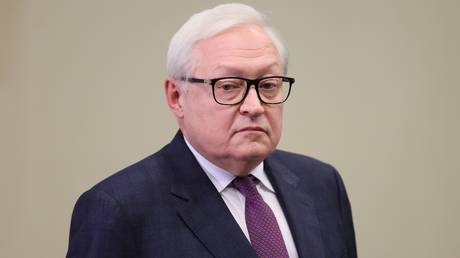 Russia-obsessed Western elites acting like delinquents – Moscow
Russia-obsessed Western elites acting like delinquents – Moscow
British Foreign Secretary David Cameron similarly suggested this month that Ukraine “has the right” to strike targets inside Russia with UK-provided weapons. Moscow in response warned that if such an attack was to happen, it would consider any British military assets, be they on Ukrainian soil or elsewhere, fair game for retaliation.
Ukrainian officials have reportedly launched a massive lobbying effort on Capitol Hill this month in an attempt to pressure the White House on its arm policy. Its legislators have claimed that Russia’s recent advances in Kharkov Region were a result of Kiev’s inability to deliver preemptive cross-border strikes.
Nuland accused Moscow of escalating the conflict with the operation and claimed that its goal was to “decimate [the city] without ever having to put a boot on the ground.” She claimed without evidence that Russian forces “have flattened a third of Kharkov” already.
The avowed neocon reasoned that US permission to attack “Russian bases” under these circumstances would not be escalatory.
READ MORE: Nuland warns against NATO training bases in Ukraine
Russian President Vladimir Putin has said the operation in Kharkov Region was meant to dismantle Kiev’s ability to attack Russia’s Belgorod Region. Ukrainian forces have been hitting villages close to the border and the city of Belgorod itself with rocket artillery and drones for months. According to Putin, Moscow has no intention to fight for Kharkov, Ukraine’s second-largest city, at this point or time.
Categories: News, Non-Catholic
US feared WWIII after Iranian president’s death – Politico
Ebrahim Raisi and other top officials were killed in a helicopter crash on Sunday
There were initial fears among US officials that the helicopter crash that killed President Ebrahim Raisi on Sunday could trigger a new world war, Politico reported on Monday. In particular, there were concerns that Tehran could seek to blame Washington and Israel for the incident, a source told the outlet.
The helicopter carrying Raisi and his entourage, including Iranian Foreign Minister Hossein Amir-Abdollahian, went down on Sunday in the country’s northwestern East Azerbaijan province. The president had been returning from a meeting with his Azerbaijani counterpart, Ilham Aliyev, after they inaugurated a major dam project on the border.
According to the IRNA news agency, the aircraft crashed due to a “technical failure,” while rescue operations were hampered by adverse weather conditions, including fog and rain.
In the aftermath of the incident, the White House is closely monitoring how Iran will react to Raisi’s death, Politico noted, adding that unnamed senior US officials do not expect any significant policy changes from Tehran.
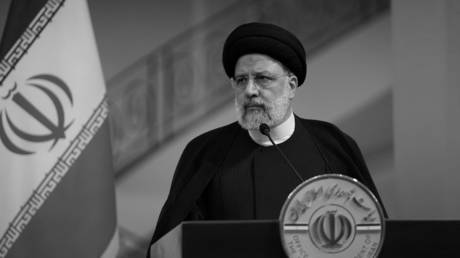 Iran’s president has died: What’s next?
Iran’s president has died: What’s next?
However, as the news of the crash broke, US officials “spent Sunday anxiously awaiting updates” on the situation. According to Politico, they were waiting to see if Iran would accuse Israel or Washington of sabotaging the helicopter, even though there was nothing to suggest this.
One unnamed official told the outlet that “for a little while, it was not a crazy question to ask ‘Is this how World War III begins?’”
US Defense Secretary Lloyd Austin has said his country played no role in the incident. Despite extremely tense relations with Iran, Washington offered “official condolences” and was willing to assist Tehran in the search operation, according to the State Department.
Referring to the crash, an unnamed Israeli official told Reuters that “it wasn’t us.” However, the chair of the Israeli opposition Yisrael Beytenu party, Avigdor Liberman, stated that West Jerusalem “won’t shed a tear” over Raisi’s death.
Iranian First Vice President Mohammad Mokhber is now acting as president, with a snap election scheduled for June 28. The Foreign Ministry in Tehran has insisted the deaths of Raisi and Amir-Abdollahian will not disrupt Iran’s international policies.
Tensions between Israel and Iran, archrivals for decades, escalated last month when Tehran accused West Jerusalem of killing several senior Iranian military officers in an attack on its consulate in Syria. In the days that followed, Iran launched a large-scale retaliation strike on the Jewish state involving hundreds of missiles and kamikaze drones.
Categories: News, Non-Catholic
Nuland warns against NATO training bases in Ukraine
The presence of Western instructors would “directly implicate” the US-led bloc, the retired diplomat has said
Former US diplomat Victoria Nuland has argued that officially sending Western instructors into Ukraine would create unnecessary risks – as NATO already provides a “huge amount” of training for Kiev’s forces on member states' territory.
Facing a severe troop shortage, Kiev has allegedly asked the US and NATO to help train some 150,000 new recruits inside Ukraine, so they can be sent to the front faster, the New York Times reported last week.
In an interview with ABC on Sunday, Nuland – who was responsible for Ukraine in her State Department role – acknowledged Russia’s renewed offensive is making it hard for Ukrainian troops to “come off the front” and train abroad. However, she warned against sending Western instructors in.
“I worry that NATO training bases inside Ukraine will become a target for Vladimir Putin. And it does directly implicate NATO on the ground, which could… escalate the war in a different direction and cause Putin to think that NATO territory might be fair game for him,” Nuland said.
Read more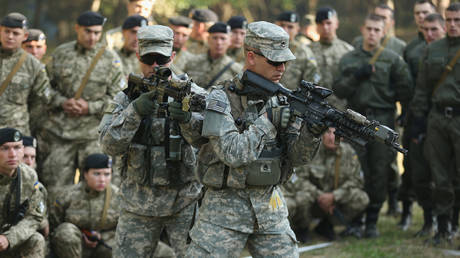 NATO members ‘considering’ sending troops to Ukraine – NYT
NATO members ‘considering’ sending troops to Ukraine – NYT
The White House has repeatedly insisted that it will not deploy American troops – even instructors – in Ukraine. The retired US diplomat argued that “it still makes most sense to do most of the training outside of Ukraine but to give advice inside Ukraine.”
The US-led military bloc has been training Ukrainian soldiers on the territory of member states including the UK, Germany and Poland, teaching them how to use Western-provided weapons. European officials have previously acknowledged the presence of some military personnel in Ukraine since the outbreak of the conflict in 2022, without clarifying whether they were training local forces.
However, on Monday Estonian Prime Minister Kaja Kallas claimed that military personnel from some NATO member states are already training Ukrainian soldiers inside the country. She insisted this will not lead to a direct confrontation with Russia because the personnel are doing it “at their own risk.”
Read more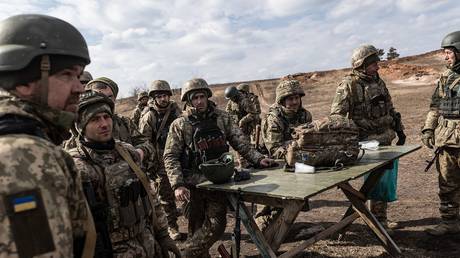 NATO countries already training troops in Ukraine – Estonian PM
NATO countries already training troops in Ukraine – Estonian PM
French President Emmanuel Macron first raised the issue of sending NATO troops to Ukraine back in February, calling it an idea that should not be ruled out. Estonia and Lithuania have since expressed support for either sending instructors or support troops, to free up Ukrainian soldiers for combat duty.
In early May, the Russian Defense Ministry estimated that Ukrainian military losses had surpassed 111,000 this year alone. Kiev now intends to mobilize hundreds of thousands of additional troops under a new law cracking down on draft avoidance.
Over the past six weeks, Russian forces have taken more territory than Ukraine managed to capture in the six months of its failed counter-offensive last year, the Washington Post admitted last week, citing numbers from the Institute for the Study of War, a DC-based think tank run by Kimberly Kagan – Victoria Nuland’s sister-in-law.
Categories: News, Non-Catholic
EU members would have to arrest Netanyahu – Borrell
All parties to the Rome Statute are bound by the International Criminal Court’s decisions, the top diplomat has said
EU foreign policy chief Josep Borrell has said that if the International Criminal Court issues arrest warrants for top Israeli officials over their alleged war crimes in Gaza, all EU member states will be legally forced to oblige.
On Monday, ICC chief prosecutor Karim Khan applied for warrants for Israeli Prime Minister Benjamin Netanyahu and Defense Minister Yoav Gallant – as well as Hamas leaders Yahya Sinwar, Mohammed Diab Ibrahim al-Masri, and Ismail Haniyeh – accusing them of “war crimes and crimes against humanity.”
The European Union has taken “note” of the move, Borrell acknowledged in a post on X (formerly Twitter).
“The mandate of the ICC, as an independent international institution, is to prosecute the most serious crimes under international law,” Borrell wrote, insisting that “All States that have ratified the ICC statutes are bound to execute the Court’s decisions.”
Even though the prosecutor has requested arrest warrants, it may take months of deliberations before a three-judge panel decides whether to issue them or not.
Read more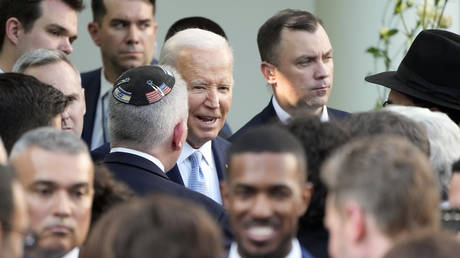 There is no genocide in Gaza – Biden
There is no genocide in Gaza – Biden
Israel is not a member of the ICC and does not recognize the jurisdiction of the court, but the State of Palestine joined the organization in 2015. The US was one of the creators of the ICC, but Congress never ratified the Rome Statute. Russia, China, India, Indonesia, Saudi Arabia and dozens of other countries also do not accept the court’s jurisdiction.
However, some 124 countries around the globe have signed and ratified the Rome Statute, including all EU member states and all candidates, except Ukraine and Türkiye. If warrants against Netanyahu and Gallant are issued, it could severely complicate the Israeli leader's ability to travel abroad.
Categories: News, Non-Catholic
Netanyahu accuses ICC of anti-Semitism
The International Criminal Court won’t stop Israel from achieving “total victory” in Gaza, the prime minister has said
Israeli Prime Minister Benjamin Netanyahu has accused the International Criminal Court (ICC) of setting a “dangerous precedent” after its top prosecutor, Karim Khan, requested arrest warrants for the Israeli leader and Defense Minister Yoav Gallant over alleged war crimes against Palestinian civilians in Gaza.
In a statement on Monday evening, Netanyahu branded the decision by the ICC prosecutor “absurd,” claiming that it “undermines every democracy’s right to defend itself.” He also insisted that the court has “no jurisdiction over Israel.”
“Mr. Khan’s abuse of this authority will turn the ICC into nothing more than a farce. He’s doing something else. He is callously pouring gasoline on the fires of anti-Semitism that are raging across the world. Through this incendiary decision, Mr. Khan takes his place among the great antisemites in modern times,” Netanyahu said.
The outrageous decision by the ICC prosecutor, Karim Khan, to seek arrest warrants against the democratically elected leaders of Israel is a moral outrage of historic proportions. It will cast an everlasting mark of shame on the international court.https://t.co/ZgIF8WM5zv pic.twitter.com/36ks3Tuj9A
— Prime Minister of Israel (@IsraeliPM) May 20, 2024The prime minister went on to claim that the Israel Defense Forces (IDF) is “the most moral army in the world” fighting a “just war that is unparalleled,” according to the Hebrew version of the statement. Israel launched its military campaign in Gaza in response to a surprise Hamas attack on its border regions in October 2023, which claimed the lives of some 1,200 people and saw around 250 taken hostage.
Read more There is no genocide in Gaza – Biden
There is no genocide in Gaza – Biden
West Jerusalem’s response involved heavy bombardments of Gaza followed by a large-scale ground operation, which is ongoing. According to data from the Palestinian enclave’s health ministry, 35,456 have been killed and 79,476 others wounded as a result of Israel’s airstrikes and ground offensive.
Netanyahu said he rejected “with disgust” what he described as Khan’s attempt to create a “twisted and false moral equivalence” between the Israeli government and the “genocidal terrorist organization” Hamas. Nothing would stop Israel from achieving “total victory” in Gaza, he vowed.
Read more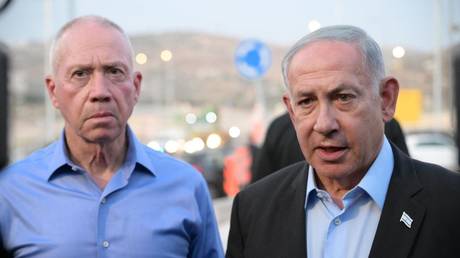 Proposed ICC warrants against Israeli officials ‘historical disgrace’ – FM
Proposed ICC warrants against Israeli officials ‘historical disgrace’ – FM
Along with Netanyahu and Gallant, Khan is also seeking arrest warrants for three top Hamas officials, including the Palestinian armed group’s leader, Yahya Sinwar, the commander of its military wing – al-Qassam Brigades – Mohammed Diab Ibrahim al-Masri, and the chief of the Hamas political bureau, Ismail Haniyeh.
Israel is not a member of the ICC and does not recognize its jurisdiction, but the State of Palestine joined the organization in 2015. If warrants against Netanyahu and Hamas leaders are issued, any of the court’s 124 member states will be obliged to arrest them if they set foot on their territory.
Categories: News, Non-Catholic
There is no genocide in Gaza – Biden
The US leader has promised to “always stand with Israel”
US President Joe Biden has dismissed arguments that Israel’s military operation in Gaza can be described as genocide, reiterating Washington’s support for West Jerusalem as he hosted an event for Jewish American Heritage month at the White House.
On Monday, the chief prosecutor of the International Criminal Court (ICC), Karim Khan, announced that he is seeking arrest warrants for Israeli Prime Minister Benjamin Netanyahu and Defense Minister Yoav Gallant, as well as Hamas leaders Yahya Sinwar, Mohammed Diab Ibrahim al-Masri, and Ismail Haniyeh, accusing them of “war crimes and crimes against humanity.”
Speaking at the White House later in the day, Biden condemned the ICC move as well as separate allegations by the UN’s International Court of Justice that Israel’s actions in Gaza could be genocidal.
“Let me be clear, contrary to allegations against Israel made by the International Court of Justice, what’s happening is not genocide. We reject that,” Biden said.
Read more US Congress threatens ICC with sanctions
US Congress threatens ICC with sanctions
Palestinian militant group Hamas carried out an incursion into Israel on October 7 which resulted in about 1,200 people being killed and 250 taken hostage. The Israeli government responded by launching a large-scale military operation in Gaza, which according to the Palestinian enclave’s health ministry has killed over 35,000 people and left almost 80,000 others wounded. Israel has vowed to continue the offensive until Hamas is completely eliminated.
“We stand with Israel to take out Sinwar and the rest of the butchers of Hamas,” Biden said on Monday. “We want Hamas defeated. We’ve worked with Israel to make that happen.”
In January, an interim ruling by the ICJ, the UN’s top court in The Hague, ordered Israel to take steps to prevent genocide and improve humanitarian conditions for Gaza’s population. The lawsuit, filed by South Africa late last year, accuses West Jerusalem of committing systematic war crimes in the Palestinian region.
Ireland announced in March that it would support Pretoria’s case, calling Israel’s actions in Gaza a “blatant violation of international humanitarian law on a mass scale.” Last week, Egypt also called on Israel to “comply with its obligations as the occupying power.”
Categories: News, Non-Catholic
US Congress threatens ICC with sanctions
Washington has condemned international court’s application for warrants targeting both Israel and Hamas
House Republicans are reportedly working on a bill to sanction the International Criminal Court, after its top prosecutor sought the arrest of both Israeli and Hamas leaders in connection with the Gaza conflict.
ICC chief prosecutor Karim Khan has accused Israeli Prime Minister Benjamin Netanyahu and Defense Minister Yoav Gallant – as well as Hamas leaders Yahya Sinwar, Ismail Haniyeh and Mohammed Diab Ibrahim al-Masri – of “war crimes and crimes against humanity” in Gaza and Israel.
House Speaker Mike Johnson, a Louisiana Republican, called the ICC move “disgraceful” and “lawless.”
“If unchallenged by the Biden administration, the ICC could create and assume unprecedented power to issue arrest warrants against American political leaders, American diplomats, and American military personnel,” Johnson said on Monday, demanding the White House “use every available tool to prevent such an abomination.”
Read more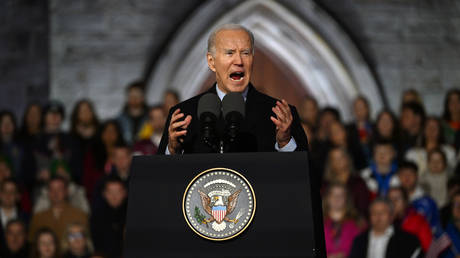 ICC prosecutor’s move to arrest Israeli officials ‘outrageous’ – Biden
ICC prosecutor’s move to arrest Israeli officials ‘outrageous’ – Biden
Michael McCaul, the Texas Republican who chairs the House Foreign Affairs Committee, told Axios on Monday that a bill to sanction the court is already being drafted, based on the February 2023 bill introduced by Senator Tom Cotton, an Arkansas Republican.
Cotton was among the dozen senators who wrote to Khan earlier this month, reminding the ICC prosecutor that the US has a law on the books allowing “all means necessary and appropriate” to defend any Americans – or allies – sought by the court. The 2002 law was nicknamed the “Hague Invasion Act.”
While some congressional Democrats have urged a hard line on the ICC, two members of the Progressive Caucus – Pramila Jayapal and Mark Pocan – have argued it was not up to Congress to dictate to an independent court.
According to Axios, Netanyahu has urged US President Joe Biden to “intervene” to prevent the ICC from approving Khan’s warrant request.
Read more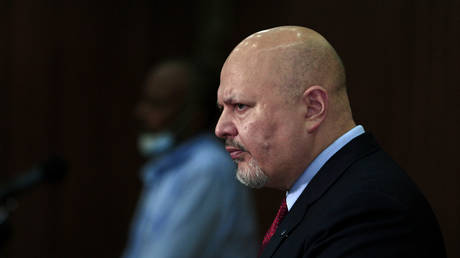 ICC chief prosecutor seeks arrest warrants for Netanyahu and Hamas leaders
ICC chief prosecutor seeks arrest warrants for Netanyahu and Hamas leaders
Biden has already denounced Khan’s motion to seek the warrants as “outrageous” and protested that it created “equivalence” between Israel and Hamas. US Secretary of State Antony Blinken insisted that the ICC “has no jurisdiction over this matter” and questioned “the legitimacy and credibility of this investigation.”
Although the US was one of the creators of the ICC, modeled after the Washington-backed war crimes tribunals for Yugoslavia and Rwanda, Congress never ratified the Rome Statute. The court has jurisdiction over the West Bank and Gaza, because the Palestinian Authority accepted it in 2015.
Categories: News, Non-Catholic
China sanctions US weapons-makers
Boeing, General Dynamics and General Atomics were punished for trading with Taiwan
The Ministry of Commerce in Beijing announced Monday that it has blacklisted Boeing’s military industry division and the companies making Abrams tanks and Reaper and Predator drones, citing their sales to Taiwan.
Boeing Defense Space & Security, General Atomics Aeronautical Systems, and General Dynamics Land Systems have been placed on the “unreliable entities” list, which bans their executives from traveling to China and blocks their further investment in the country.
General Atomics builds the MQ-1 Predator and MQ-9 Reaper drones. According to AP, it was unclear whether any have been sold to Taiwan.
General Dynamics produces the M1 Abrams and South Korea’s K1/Type88 main battle tanks, as well as the Stryker family of light armored vehicles, among others. The US has sought to sell the Abrams to the authorities in Taipei as a deterrent from a hypothetical “invasion” from the mainland.
Boeing Defense’s CEO Ted Colbert was sanctioned by China in 2022, after the company won the $355 million contract to supply Taiwan with Harpoon anti-ship missiles.
Read more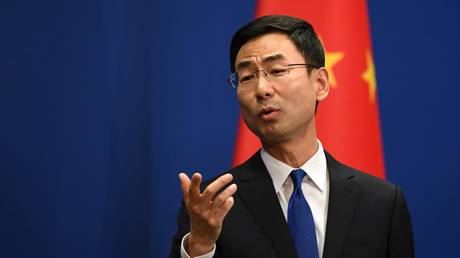 China warns US over Ukraine
China warns US over Ukraine
The Chinese sanctions were announced on the day Lai Ching-te was sworn in as the new president in Taipei. His Democratic Progressive Party (DPP) has vowed to bolster the domestic military industry and buy more advanced weapons from abroad.
Ceded to US troops by Japan in 1945, Taiwan became the last refuge of nationalist forces after their defeat in the Chinese civil war four years later. Washington recognized it as ‘Republic of China’ until 1979, when it established diplomatic relations with Beijing as the sole legitimate government of China.
Beijing’s ‘One China’ policy seeks the peaceful reintegration of the island and to prevent any attempt to declare it a sovereign nation, with military force if necessary.
Earlier this month, the US sanctioned dozens of Chinese companies involved in quantum computing research, as well as 26 companies sourcing cotton and textiles from Xinjiang province, where Washington claims Beijing is committing “genocide” against the local Uighurs. China has denied the accusations as malicious lies.
Categories: News, Non-Catholic
Israel wasn’t involved in Iranian president’s fatal helicopter crash – Reuters
Ebrahim Raisi and others died on Sunday in the country’s northwestern East Azerbaijan province
The Israeli government had nothing to do with the death of Iranian President Ebrahim Raisi, Reuters has reported, citing an unnamed official.
The helicopter carrying Raisi and several other officials, including Foreign Minister Hossein Amir-Abdollahian, went down on Sunday afternoon in a mountainous region of northwest Iran. After more than ten hours of searching – hampered by fog and rain – the president and his entourage were confirmed dead.
The head of state had traveled to the border region after joining Azerbaijan’s President Ilham Aliyev on Saturday to inaugurate a dam. Raisi had pledged to visit each of Iran’s 30 provinces at least once a year, and so was regularly traveling around the country.
His death has prompted speculation that Iran’s long-time foe Israel could be behind the accident.
On Monday, an Israeli official, who requested anonymity, denied the nation’s involvement in the crash, telling Reuters: “It wasn’t us.”
The latest round of tensions between Israel and Iran began on April 1, after an alleged Israeli airstrike hit the Iranian consulate in the Syrian capital Damascus. The strike killed seven officers of the Islamic Revolutionary Guard Corps (IRGC) Quds Force, including two high-ranking generals.
Read more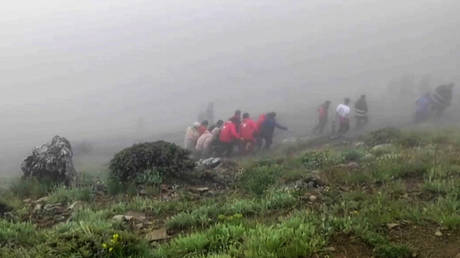 Iranian president killed in helicopter crash: What we know so far
Iranian president killed in helicopter crash: What we know so far
In response, Tehran launched scores of drones and missiles at Israel, which later retaliated with a handful of drones and air-launched missiles.
The Islamic Republic has vowed on multiple occasions to wipe out, destroy or annihilate the “Zionist regime,” as it calls Israel.
Israel’s Minister of Heritage, Amichay Eliyahu, reacted to the news of Raisi’s death by posting an image of a wine glass on X (formerly Twitter), accompanied by a “Cheers” in the caption.
Avigdor Lieberman, former defense minister and leader of the opposition right-wing Yisrael Beiteinu party, told the Ynet news site that Israel “will not shed a tear for the death of the Iranian president.”
Iranian Supreme Leader Ayatollah Ali Khamenei has declared five days of mourning in the country for the victims of the crash. Raisi’s deputy, Mohammad Mokhber, has taken over the presidency after Khamenei’s approval on Monday. Mokhber will hold the post for 50 days until an election is held.
Categories: News, Non-Catholic
Zelensky a ‘legitimate military target’ – Medvedev
The Ukrainian leader, whose term in office expires this week, has been deemed a “war criminal” by Russia, former President Dmitry Medvedev has said
Ukrainian President Vladimir Zelensky, as the leader of a “hostile political regime,” is a legitimate military target, Dmitry Medvedev, the head of Russia’s Security Council, has said.
Speaking to TASS on Monday, Medvedev said that the question of Zelensky’s legitimacy as president is of no particular importance to Moscow.
“For Russia, the final loss of legitimacy by the pseudo-president of the former Ukraine will not change anything,” the former Russian president said, noting that the leaders of countries waging war are “always considered” a legitimate military target.
Medvedev called Zelensky a “war criminal,” who should be caught and brought to justice or “liquidated as a terrorist” for his crimes against Russians and Ukrainians.
Zelensky appeared on the Russian Interior Ministry’s wanted list earlier this month though no data has been released about criminal proceedings against him.
The constitutional powers of the current Ukrainian president expired on May 20. A presidential election was originally scheduled for March, but was postponed under the pretext of martial law, which was imposed after the start of the conflict with Russia in February 2022, and has repeatedly been extended by the nation’s legislature.
Zelensky announced in December 2023 that no presidential or parliamentary elections would be held as long as martial law remains in force. In early May, lawmakers prolonged martial law by another three months.
Read more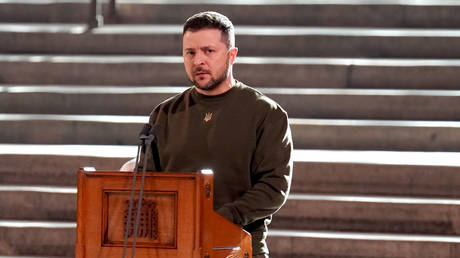 Zelensky’s presidential term expires
Zelensky’s presidential term expires
According to Medvedev, Zelensky “effectively seized power” in the country after elections were annulled.
“He spat on the constitution of his ‘country,’ ignored the Constitutional Court, and did not even extend, but usurped the supreme power,” Medvedev argued, adding that Zelensky “covered himself with an inarticulate declaration of the Verkhovna Rada (the Ukrainian parliament) on the abolition of presidential elections in times of war.”
In March, Ukrainskaya Pravda claimed, citing members of parliament, that Zelensky had virtually stripped the legislature of its powers and established de facto personal rule.
Kremlin spokesman Dmitry Peskov said recently that a “moment will come soon when many people, including those inside Ukraine, will question [President Zelensky’s] legitimacy.”
Categories: News, Non-Catholic
ICC prosecutor’s move to arrest Israeli officials ‘outrageous’ – Biden
Washington will always stand with West Jerusalem, the US president has stated
The International Criminal Court lacks jurisdiction over Israel and should not consider it equivalent with Hamas in any way, the White House and the State Department both said Monday.
ICC chief prosecutor Karim Khan has accused Israeli Prime Minister Benjamin Netanyahu and Defense Minister Yoav Gallant – as well as Hamas leaders Yahya Sinwar, Mohammed Diab Ibrahim al-Masri, and Ismail Haniyeh – of “war crimes and crimes against humanity” in Gaza and Israel.
“The ICC prosecutor’s application for arrest warrants against Israeli leaders is outrageous,” US President Joe Biden said in a written statement. “And let me be clear: whatever this prosecutor might imply, there is no equivalence – none – between Israel and Hamas. We will always stand with Israel against threats to its security.”
Secretary of State Antony Blinken also responded to the ICC announcement, saying that the US “fundamentally rejects” its “shameful” attempt to equate Israel with Hamas, which he called a “brutal terrorist organization that carried out the worst massacre of Jews since the Holocaust.”
The ICC “has no jurisdiction over this matter,” Blinken insisted, noting that the court has previously deferred to national judiciaries, and questioned “the legitimacy and credibility of this investigation.”
Read more Proposed ICC warrants against Israeli officials ‘historical disgrace’ – FM
Proposed ICC warrants against Israeli officials ‘historical disgrace’ – FM
The announcement doesn’t help, and could hurt, the efforts to reach a ceasefire, secure the release of hostages, and provide more humanitarian aid to the Palestinians in Gaza, Blinken added.
Netanyahu has denounced Khan’s request as a “political outrage” that will not stop Israel from waging war against Hamas. An unnamed official from his cabinet described the ICC prosecutor’s move earlier on Monday as a “baseless blood libel against Israel” and “lawfare efforts against the lone Jewish state and the only democracy in the Middle East.”
Mentioning Netanyahu and Gallant “alongside the vile Nazi-like monsters of Hamas [is] a historical disgrace that will be remembered forever,” said Foreign Minister Israel Katz, while Justice Minister Yariv Levin slammed the move as “one of the greatest moral disgraces in human history,” and suggested that the “attempt to deny the State of Israel the right to self-defense” was an expression of “modern anti-Semitism and hatred of Jews wherever they are.”
The ICC “equates the victim with the executioner” and could encourage Israel to continue its “war of extermination” in Gaza, Senior Hamas official Sami Abu Zuhri has told Reuters.
Washington has a law allowing “any means necessary” to defend American troops and allies from ICC warrants, a dozen US Senators wrote to the ICC earlier this month, implying that Khan and others might find themselves targeted by the “Hague invasion act.”
Categories: News, Non-Catholic
China warns US over Ukraine
Beijing has pushed back against Washington’s “groundless” claims it is arming Moscow’s troops
Washington is deliberately prolonging the Ukraine conflict and seeking to profit from it, while “smearing” Beijing with false accusations, the Chinese deputy envoy to the UN told the Security Council on Monday.
During the meeting on the Ukraine conflict, Ambassador Geng Shuang addressed US claims that China was supplying Russia with weapons components, calling them “groundless” and “totally unacceptable.”
“China is not the creator, or a party to the Ukraine crisis,” said Geng. “Nor have we provided lethal weapons to any party in the conflict. We have not done… what the US has done, which is to deliberately prolong the fighting and profit from the crisis. We will not do that.”
The Chinese diplomat warned that the fighting in Ukraine is being prolonged by large quantities of weapons and ammunition of “expanding variety and scope,” supplied to Kiev by the US and its allies. Meanwhile, Beijing has consistently advocated for a ceasefire and a diplomatic settlement of the crisis.
“Weapons may end wars, but they do not bring about lasting peace,” Geng told the Security Council.
Read more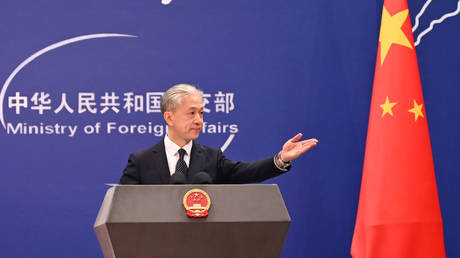 China slams US for ‘shifting blame’ over Ukraine conflict
China slams US for ‘shifting blame’ over Ukraine conflict
He reiterated Beijing’s position that US and EU sanctions on Chinese companies doing business with Russia are unilateral and illegitimate.
“China has a right to carry out normal economic and trade cooperation with all countries in the world, including with Russia, and such cooperation should not be interfered with or undermined,” the diplomat said. “We urge the US to stop attacking, smearing, and slandering China and spreading fabrications, and stop unilateral sanctions against, and unreasonable suppression of, Chinese enterprises.”
While the US and its allies have poured over $200 billion worth of weapons, equipment and ammunition into Ukraine – while insisting that does not make them party to the hostilities – they have repeatedly accused China of helping the Russian military by exporting dual-use goods, and threatened Beijing with sanctions.
The Chinese Foreign Ministry addressed the accusations directly last week, telling Washington that “diverting attention and shifting the blame is not the right way” to solve the conflict.
On Monday, Geng added that the US needs to “stop taking advantage of the Ukraine crisis to advance its geopolitical strategy, provoke bloc confrontation, and serve its own agenda.”
Categories: News, Non-Catholic
A new coup attempt in Türkiye: Who wants Erdogan gone?
The Turkish president faces a difficult time of internal instability and a foreign policy tightrope between Russia and the West
On May 15, Turkish President Recep Tayyip Erdogan addressed members of parliament with a statement about a new attempted coup in the country. He said the alleged conspirators were supporters of preacher Fethullah Gulen, who resides in the US.
The day before, according to Turkish media reports, law enforcement conducted searches at the Ankara Security Directorate and the homes of high-ranking officials. As a result of the raids, a group of police officers was detained on suspicion of “conspiracy to commit a crime.” Later, the Ankara prosecutor’s office announced the start of an investigation into three officers from the capital’s police department regarding their connection with the leader of an organized crime group, Ayhan Bora Kaplan.
The same day, Interior Minister Ali Yerlikaya posted on X (formerly Twitter) about a large-scale police operation in 62 provinces of the country, during which 544 people, presumably linked to Gulen, were detained. The next day, Yerlikaya warned on social media that Turkish law enforcement would identify and hold accountable all conspirators within government institutions.
On May 14, the leader of the Nationalist Movement Party (MHP) and Erdogan’s ally in the parliamentary coalition, Devlet Bahceli, was the first to inform the parliament about a possible coup attempt. He stated that some law enforcement officers were trying to repeat the events of the failed military coup of 2016 and called not to limit the response to merely dismissing “a few police officers.”
Read more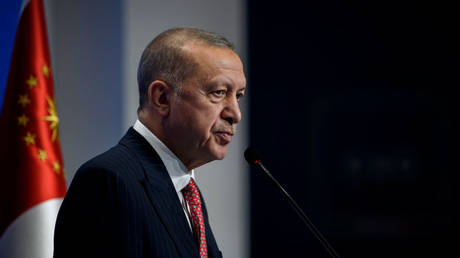 Türkiye at a crossroads: Is the Erdogan era over?
Türkiye at a crossroads: Is the Erdogan era over?
From allies to adversaries: The relationship between Erdogan and Gulen
In recent years, Turkish authorities have frequently spoken about Gulenists who “failed to achieve their goals in 2016 and continue to harm the country.” But what led to such mutual intolerance?
Fethullah Gulen, a Turkish cleric born in 1941, founded the Hizmet movement, also known as the Gulen movement, in the late 1960s. The movement emphasizes moderate Islam, education, and community service, and has a global presence with schools and cultural centers in over 160 countries. Since 1999, Gulen has lived in self-imposed exile in Pennsylvania, US. The Hizmet movement continues to operate worldwide, though its activities in Türkiye are severely restricted.
The early 2000s marked a period of rapprochement between Erdogan and Gulen, two prominent figures in Türkiye’s Islamist movement. Erdogan, a former member of the Islamist Welfare Party, co-founded the Justice and Development Party (AKP) in 2001. Gulen and his Hizmet movement focused on moderate Islam and interfaith dialogue.
Initially, Erdogan and Gulen found common ground in their opposition to Türkiye’s secular establishment, which was deeply entrenched in the military and judicial system. Both aimed to reduce the influence of the Kemalist elite and promote more Islam-oriented governance. The Gulen movement provided significant support to the AKP, including mobilizing voters and embedding loyalists within the state apparatus. In return, Erdogan’s government allowed Gulen-affiliated institutions, such as schools and media outlets, to thrive, helping the AKP consolidate power.
Over time, differences in their visions for Türkiye’s future and power-sharing dynamics began to create friction. Erdogan’s drive to centralize power conflicted with Gulen’s extensive influence in the judiciary, police, and media. By 2010, relations began to deteriorate, especially after the 2010 constitutional referendum, which both initially supported. The referendum increased the government’s control over the judiciary, later contributing to the power struggle between the AKP and the Gulen movement.
The first major public fallout occurred during the MIT crisis in 2012, when prosecutors linked to Gulen attempted to interrogate Hakan Fidan, then head of Türkiye’s National Intelligence Organization (MIT) and a close Erdogan ally. Erdogan saw this as a direct challenge to his authority. The conflict escalated dramatically in December 2013 when a corruption investigation targeted Erdogan’s inner circle, including his family and cabinet members. Erdogan accused Gulenists of orchestrating the probes to undermine his government, leading to a significant purge of alleged Gulen supporters from the police and judiciary.
Following the 2013 corruption scandal, Erdogan intensified his crackdown on the Gulen movement. He labeled the movement a “parallel state” and an existential threat to Türkiye’s sovereignty. The government shut down Gulen-affiliated media outlets, schools, and businesses, with thousands of alleged Gulenists arrested or dismissed from public service. Public accusations became more frequent and severe. Erdogan accused Gulen of leading a shadowy organization aimed at overthrowing the government. In 2014, Gulen was charged with leading a terrorist organization. The AKP government sought Gulen’s extradition from the US, a request that remained unfulfilled.
The 2016 coup attempt in Türkiye
By 2016, the relationship between Erdogan and Gulen had turned into open hostility. The failed coup attempt on July 15, 2016, was the culmination of this animosity.
Read more ‘We are in danger because of NATO membership’: Turkish Patriotic party is sounding the alarm
‘We are in danger because of NATO membership’: Turkish Patriotic party is sounding the alarm
Under President Erdogan, Türkiye has experienced increasing political polarization. His ruling party, the AKP, centralized power, alienating many factions within Turkish society, including secularists, Kurds, and even some Islamists who felt marginalized. Historically, the Turkish military saw itself as the guardian of secularism and Kemalist principles. Erdogan’s push for more Islam-oriented policies and his efforts to reduce the military’s influence through purges and reforms created significant friction.
Economic difficulties and social unrest further fueled discontent. Rising unemployment, inflation, and issues such as the Kurdish question and the Syrian refugee crisis created an atmosphere of instability. The coup attempt rapidly unfolded on the night of July 15, 2016. Late in the evening, a faction within the Turkish Armed Forces attempted to seize control of key institutions and infrastructure, including bridges in Istanbul, government buildings in Ankara, and media outlets. They declared martial law and imposed a curfew.
President Erdogan’s response was swift and resolute. In the early hours of the coup, he addressed the nation via a FaceTime call on CNN Türk, urging people to take to the streets to resist the coup plotters. This call to action played a significant role in mobilizing thousands of citizens to confront the military. Erdogan, who was vacationing in Marmaris, managed to evade capture and flew back to Istanbul, landing amid ongoing chaos. His return significantly boosted the morale of loyalist forces and civilians.
By the morning of July 16, the uprising had been suppressed, and Erdogan initiated a sweeping purge of suspected coup supporters. These included not only military personnel but also thousands of judges, civil servants, teachers, and police officers accused of ties to the Hizmet movement. The government declared a state of emergency, which lasted for two years, granting Erdogan broad powers to arrest, detain, and dismiss individuals perceived as threats to the state. The coup attempt allowed Erdogan to further consolidate his power. Constitutional changes were enacted, transforming Türkiye from a parliamentary system to a presidential one, significantly expanding Erdogan’s executive powers.
The coup attempt was a dramatic and violent event rooted in deep political, military, and social tensions. President Erdogan’s swift and decisive response not only quashed the coup but also led to significant restructuring of Türkiye’s political landscape. The aftermath saw widespread suppression of dissent and consolidation of power, which in the following years, fundamentally changed Turkish governance and society.
Do the Gulenists want to overthrow Erdogan again?
After the 2016 military coup attempt, Turkish officials and the public repeatedly claimed that Western countries were involved in anti-government activities. They asserted that Western nations were aiding Gulen’s supporters and exerting pressure on Turkish authorities. These statements are based on the belief that the more President Erdogan pursued an independent policy and defended Ankara’s interests, which did not always align with Western countries, the more NATO pressured Türkiye. Although the West condemned the coup attempt, Gulen was never extradited, which worsened relations with Ankara.
The conditions under which the 2016 and 2024 coup attempts occurred are similar. The country is experiencing economic instability, high inflation, a decline in real incomes, currency devaluation, and the massive presence of refugees from Syria, Afghanistan, and other countries. All these factors polarize society and create tension. The municipal elections held in March led to the ruling party’s first defeat in two decades and caused a split within it. The intra-coalition struggle between the MHP, led by Devlet Bahceli, and Erdogan’s supporters in the AKP is intensifying. There is a trend towards Erdogan’s rapprochement with the opposition Republican People’s Party (CHP), which gained the majority of seats in major cities and the capital.
This time, the coup attempt was more covert and less effective. The authorities actively engaged in purging individuals sympathetic to Gulen and implemented significant transformations within the military. This was a crucial step in Erdogan’s fight against his opponents, as the history of the Turkish Republic shows that real coups are most often carried out by the military, and the authorities managed to address this issue.
Read more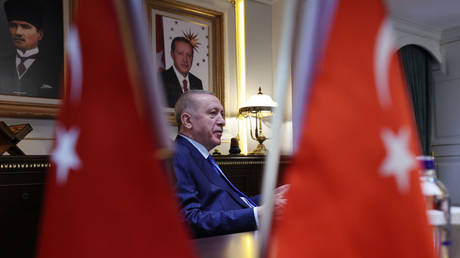 Türkiye first: How Erdogan’s policies evolved from EU-aligned reforms to conservative Islamism
Türkiye first: How Erdogan’s policies evolved from EU-aligned reforms to conservative Islamism
The external context also plays an important role. After the defeat in the municipal elections and the worsening economic situation, Ankara began seeking support from Western countries. However, Washington and Brussels are in no hurry to back their important NATO partner. They are betting on the opposition to Erdogan and trying to get rid of him. It is known that the “democracies of the world” are willing to go to great lengths for their interests, so they might covertly support internal unrest in Türkiye if it helps remove the current government.
Thus, strained relations between Türkiye and the West, suspicions of involvement in anti-government activities, and internal economic problems create a complex political environment in the country. These factors continue to influence Türkiye’s domestic and foreign policy, shaping the future of the state in conditions of ongoing instability.
The situation in Türkiye remains complex and multifaceted, reflecting deep political, social, and economic issues exacerbated by suspicions of foreign interference and internal discord. The 2016 and 2024 coup attempts demonstrate how economic instability, social tension, and political struggle can explosively combine, creating a breeding ground for crises. Erdogan, seeking to consolidate his power, faces serious challenges both domestically and internationally.
With deteriorating relations with the West and ongoing internal polarization, Türkiye’s future remains uncertain. It is important for the country to actively participate in the construction of a new world order, taking into account its strategic interests and role on the international stage. Türkiye is faced with the necessity of making a choice in the global confrontation between Russia and the West, requiring its leaders to take a nuanced and strategic approach.
Thus, Türkiye must find a balance between internal stability and foreign policy aimed at strengthening its position in the world. This will require significant efforts from its leaders and society to achieve prosperity in a changing global landscape.
Categories: News, Non-Catholic
Proposed ICC warrants against Israeli officials ‘historical disgrace’ – FM
Prime Minister Benjamin Netanyahu and Defense Minister Yoav Gallant have been accused of committing war crimes in Gaza
Top Israeli officials have expressed outrage over the International Criminal Court chief prosecutor’s request that warrants be issued for the arrest of Prime Minister Benjamin Netanyahu and Defense Minister Yoav Gallant.
On Monday, ICC Prosecutor Karim Khan stated that there are “reasonable grounds to believe” that the Israeli leader and his defense minister are guilty of “war crimes and crimes against humanity” due to their complicity in the IDF’s military operation in Gaza. Khan announced that he is officially seeking warrants for the arrest of Netanyahu and Gallant, as well as three Hamas officials.
In response, Israeli Foreign Minister Israel Katz called Khan’s request an “unrestrained direct attack” on the victims of the October 7 Hamas massacre which prompted the IDF’s response.
“While Hamas murderers and rapists commit crimes against humanity, against our brothers and sisters, the [ICC] prosecutor mentions in the same breath the prime minister and defense minister of Israel alongside the vile Nazi-like monsters of Hamas – a historical disgrace that will be remembered forever,” Katz said in a statement which was quoted by the Times of Israel.
Israeli Justice Minister Yariv Levin slammed the move as “one of the greatest moral disgraces in human history,” and suggested that the “attempt to deny the State of Israel the right to self-defense” was an expression of “modern anti-Semitism and hatred of Jews wherever they are.”
Read more ICC chief prosecutor seeks arrest warrants for Netanyahu and Hamas leaders
ICC chief prosecutor seeks arrest warrants for Netanyahu and Hamas leaders
Netanyahu, speaking at a meeting of legislators from his Likud Party, called Khan’s proposal a “political outrage” and stated that regardless of the ICC’s decision, Israel will continue its operation in Gaza “until the hostages are released and Hamas is destroyed.”
Earlier on Monday, an unnamed official within Netanyahu’s office also told the Times of Israel that the ICC prosecutor’s move is “baseless blood libel against Israel [that] has crossed a red line in [Khan’s] lawfare efforts against the lone Jewish state and the only democracy in the Middle East.”
Israeli war cabinet minister Benny Gantz, one of Netanyahu’s primary political rivals, has also denounced the ICC prosecutor’s decision, stating that “drawing parallels between the leaders of a democratic country determined to defend itself from despicable terror to leaders of a bloodthirsty terror organization is a deep distortion of justice and blatant moral bankruptcy.”
In a statement to Reuters, senior Hamas official Sami Abu Zuhri also condemned the proposed warrants against the Palestinian group’s leaders, stating that such a move “equates the victim with the executioner” and could encourage Israel to continue its “war of extermination” in Gaza.
While Israel does not officially recognize the ICC’s jurisdiction, the State of Palestine has been a member of the organization since 2015. If the court fulfills Khan’s request and issues warrants for the arrest of Israeli and Hamas officials, any of the organization’s 124 member nations will be obligated to arrest them if they set foot on their territory.
On October 7, 2023, Hamas fighters attacked Israel, killing approximately 1,200 and taking 250 more hostage. In response, Israel launched a large-scale military operation in Gaza. According to the Palestinian enclave’s health ministry, over 35,000 have lost their lives and almost 80,000 others have been wounded so far as a result of the IDF’s airstrikes and ground offensive.
Categories: News, Non-Catholic
State Department cracks down on Gaza-related leaks – Politico
Word of Antony Blinken’s displeasure was leaked to the media
US Secretary of State Antony Blinken has directed his aides to stop the leaks of confidential discussions related to the Israel-Hamas conflict to the media, an unnamed State Department official told Politico.
Reuters got a hold of an internal State Department memo at the end of April, showing that several officials had advised Blinken that Israel’s assurances about US-supplied weapons were not “credible or reliable.” Someone at Foggy Bottom has also leaked details of proposals to broker a ceasefire and free the Israelis held captive by Hamas.
Blinken criticized the department leadership at a meeting earlier this month and said the leaks made diplomacy more difficult, but also “eroded trust within the State Department that documents or details of closed-door conversations wouldn’t find their way to a reporter,” according to Politico’s description.
The top diplomat urged his direct underlings to “help plug the leaks,” in particular those related to the conflict in Gaza, three unnamed officials told the outlet. One of them added that Blinken’s message had been “sternly delivered” throughout the department.
Read more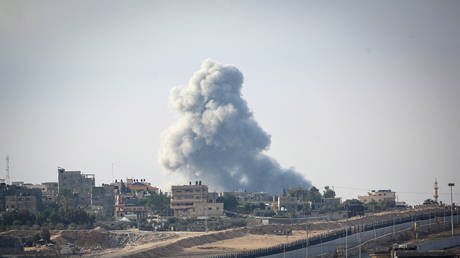 US House pushes through bill to send arms to Israel
US House pushes through bill to send arms to Israel
The “constant stream of leaks” from Foggy Bottom is causing “increasing unease” in the Biden administration, according to Politico, and “underscores the intense frustrations” in Washington with failures to free the hostages and deliver humanitarian aid to Palestinians.
Reports that lower-level officials believed Israel wasn’t using US-provided weapons in accordance with international law made Blinken “particularly displeased.” To comply with congressional demands for reporting on such matters, the White House said last week that it was “reasonable” to assume Israel was in violation, but stopped short of a formal assessment that would require weapons deliveries to stop.
Earlier this month, Israel shrugged off public warnings from the US not to proceed with an attack on Rafah, a city in southern Gaza that most of the food and other aid for the Palestinian enclave was coming through. Talks between Israel and Hamas broke down completely over the weekend.
On Monday, the International Criminal Court – which neither the US nor Israel recognize – sought arrest warrants for both Israeli and Hamas leaders. Washington has previously threatened the ICC with military intervention should it dare to prosecute Israelis.
Categories: News, Non-Catholic
Assange secures big win in US extradition hearing: How it happened
The UK High Court ruled that Washington’s assurances of a fair trial for the WikiLeaks founder were insufficient, allowing a full appeal
The High Court in London has ruled that WikiLeaks co-founder Julian Assange has the right to appeal an extradition request by the US. Washington is seeking to put the Australian publisher on trial for espionage for disclosing alleged war crimes committed by the US in Iraq and Afghanistan.
What Monday’s hearing was about
The UK High Court considered Washington’s assurances that Assange would be given a fair trial if extradited to the US. The court had previously requested two sets of written guarantees from the US stating that the WikiLeaks founder would not be discriminated against due to his Australian citizenship, and would not be held in a maximum security prison or receive the death penalty.
If the court had ruled that these guarantees were adequate, Assange would likely have been extradited to the US in a matter of days.
Read more US promises not to execute Assange – reports
US promises not to execute Assange – reports
US assurances
While the US had provided the assurances, it did so with a number of conditions. The American side promised not to immediately place Assange in a maximum security prison, but reserved the right to do so based on his conduct.
US prosecutors also stated that the WikiLeaks founder would be able to rely on the First Amendment right to free speech during the trial, but noted that its applicability would be “exclusively within the purview of the US courts.”
Public support and criticism of US guarantees
Assange’s supporters slammed Washington’s diplomatic assurances, with Amnesty International’s criminal justice expert Juli Hall calling them “inherently unreliable because the US government gives itself an out.”
The publisher’s wife, Stella Assange, had also described the US guarantees as “blatant weasel words.”
Ahead of Monday’s ruling, hundreds of demonstrators gathered outside the High Court in London calling for Assange’s immediate release.
Assange’s defense
During the hearing, Assange’s lawyer Edward Fitzgerald told the judges that the assurances of a fair trial given by US prosecutors could not be relied upon as American courts would not be bound by them.
“We say this is a blatantly inadequate assurance,” Fitzgerald told the court.
Read more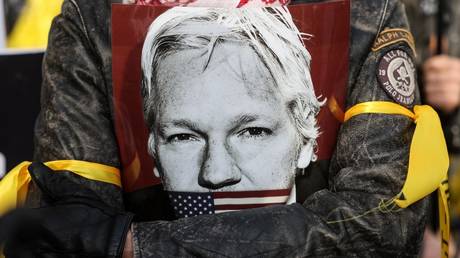 Assange marks five years in British prison
Assange marks five years in British prison
The verdict
In a short ruling, the two senior judges of London’s High Court stated that the assurances provided by the US were not sufficient, and gave Assange’s legal team the right to a full appeal hearing.
While the legal battle continues, Assange himself will remain in London’s top-security Belmarsh Prison, where he has been held for the past five years since his arrest in 2019 when his asylum in the Ecuadorian Embassy in London was revoked.
Response to the ruling
The legal victory was immediately celebrated by Assange’s supporters, with Amnesty International’s Simon Crowther calling it a “rare piece of positive news for Julian Assange and all defenders of press freedom.”
“We spent a long time hearing the United States putting lipstick on a pig but the judges did not buy it” - @Stella_Assange reacting to the breaking news of the courts granting #JulianAssange the right to appeal his extradition
Livestream: https://t.co/tOe9QXtAdC
Donate here:… pic.twitter.com/lc0siJjYyS
Stella Assange applauded the court’s verdict, claiming it had made the “right decision.” She criticized the US for the ongoing persecution of her husband, and demanded that Washington “read the situation” and drop the case against him.
Former Labor Party leader Jeremy Corbyn also celebrated Monday’s verdict, but stressed that there was still a lot to be done to secure Assange’s freedom.
Categories: News, Non-Catholic
Iran’s president has died: What’s next?
Ebrahim Raisi, the leader of the Islamic Republic, has died in a helicopter crash; how will he be remembered?
The Iranian authorities have officially confirmed that a helicopter crash on May 19 resulted in the death of President Ebrahim Raisi, as well as eight others.
Among the victims were Iranian Foreign Minister Hossein Amir-Abdollahian, the governor of East Azerbaijan Province, Malik Rahmati, and Supreme Leader Ayatollah Ali Khamenei’s representative in Tabriz, Imam Mohammad Ali Al-Hashem.
As stipulated by Article 131 of the Iranian Constitution, First Vice President Mohammad Mokhber will temporarily assume the duties of the president for 50 days, until a new presidential election is organized by a special council.
How It Happened
The news that Raisi’s helicopter had initially gone off radar before making a crash landing was reported by Iranian news agencies at around 13:00 GMT the previous day. Conflicting reports then surfaced, many of which turned out to be false. Initially, it was reported that the president and all others on board had survived and were en route to Tabriz in a motorcade. This was later contradicted; there was a later false claim that contact had been made with some passengers and that rescue teams were heading to the crash site.
Conducting the operation to reach the site was extremely challenging due to adverse weather conditions and the difficult terrain of Iran’s East Azerbaijan Province. There were reportedly three helicopters in the presidential convoy; the other two, carrying ministers and officials, reached their destinations safely.
Read more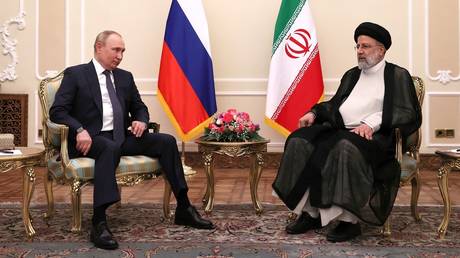 Putin pays tribute to late Iranian president
Putin pays tribute to late Iranian president
Raisi was returning from a meeting with Azerbaijani President Ilham Aliyev. The two leaders had participated in the opening ceremony at the Gyz Galasy dam (‘Maiden Tower’ in Azerbaijani) on the border between their countries. The heads of state visited various sections of the dam and were briefed on the details of construction and its benefits. On Sunday morning, Raisi arrived at Tabriz International Airport and took a helicopter to the Azerbaijani border, approximately 100km away, to take part in the ceremony.
The return route was planned to be the same. However, after a few hours, it became known that the helicopter carrying the president had disappeared from radar.
One of the first countries to offer help was Russia. President Vladimir Putin issued a directive and Moscow sent two planes, a helicopter, and 50 rescuers to the vicinity of the crash to assist in the search for Raisi’s helicopter. Additionally, Turkey, Saudi Arabia, Iraq, and Azerbaijan also expressed their support and offered assistance.
The rescue operations continued throughout the night, but the incoming information remained highly contradictory. Late in the evening, Iran’s deputy foreign minister announced that Imam Mohammad Ali Al-Hashem, who was with Raisi, had allegedly made contact twice, complaining that he was feeling unwell. A representative of the Islamic Revolutionary Guard Corps (IRGC) also stated that the helicopter had been located, but this information was later refuted by the head of Iran’s Red Crescent Society. Similar confusion was observed in the Iranian media.
It seemed that the Iranian people wanted to believe in a miracle. Tens of thousands of residents took to the central streets and squares of cities, holding prayer vigils for the president’s well-being. However, the miracle did not occur. Early in the morning on May 20, rescuers discovered the crash site of the helicopter, which had been completely incinerated, leaving nothing but ashes. The head of the Ministry of Health and Medical Education of the Islamic Republic stated that DNA testing would be necessary for identifying some of the victims.
President Raisi: His Legacy
Raisi is a controversial figure in Iran’s modern history. Before becoming president in 2021, he was the head of Iran’s strict judiciary. At age 25, Raisi became deputy prosecutor of Tehran and rapidly climbed the judicial ladder, later becoming Iran’s attorney general.
Just before the 2021 presidential election, he served as chief justice of the Supreme Court.
During his tenure as the head of Iran’s judiciary, Raisi was sanctioned by the US and faced significant distrust within Iran due to his role in the legal system. He won the presidency in an election marked by the lowest voter turnout in Iran’s history, with only 49% participation, and secured nearly 60% of the votes.
Read more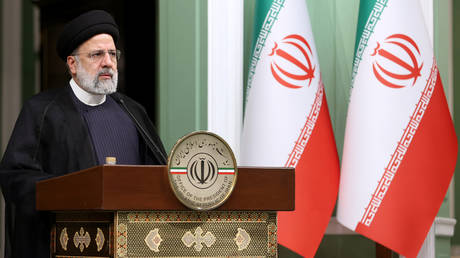 Iranian president confirmed dead in helicopter crash
Iranian president confirmed dead in helicopter crash
Raisi’s presidency was marked by the ‘Hijab Revolution’ in autumn 2022, when millions protested for the liberalization of women’s dress codes after the notorious death of a 21-year-old girl, allegedly at the hands of law enforcement, for wearing her headscarf incorrectly.
Despite his controversial background, Raisi proved to be a pragmatic and consistent leader. His political strategy focused on strengthening ties with neighboring and regional allies rather than the West, in stark contrast to his predecessor, the more liberal Hassan Rouhani. Under Raisi, Iran cemented its relationship with the Shanghai Cooperation Organization (SCO), becoming a full member, and joined BRICS. Tehran also began a phased integration with the Eurasian Economic Union (EAEU) and expanded its relations with Russia.
Under Raisi, Iran-Russia relations reached new heights both militarily and economically, with bilateral trade surpassing $5 billion, and the introduction of visa-free travel for tourists between the two countries. Raisi’s presidency saw Tehran firmly align its foreign policy priorities with Russia and China.
Despite his conservative stance and opposition to the West, Raisi and his administration made efforts to negotiate with the US through European intermediaries, aiming to revive the nuclear deal. However, these attempts were unsuccessful. The Biden administration ultimately refused to re-enter the Joint Comprehensive Plan of Action (JCPOA), and the EU proved ineffective as a mediator. Consequently, Iran continued to advance its nuclear program, resisting pressure from Washington and Brussels.
Raisi also restored diplomatic relations with a number of predominantly Muslim countries, including Saudi Arabia, Kuwait, Egypt, Libya, Sudan, Djibouti, Turkey, Qatar, and the Maldives, and strengthened ties with several post-Soviet republics. Under his leadership, Iran managed to retrieve £400 million from the UK for a canceled 1979 tank contract. Furthermore, Iran increased its oil production to 3.4 million barrels per day, exceeding pre-sanction levels. Raisi’s tenure also saw Iran challenge Israel directly, conducting a large-scale operation and launching a missile strike in retaliation for an Israeli attack on the Iranian consulate in Damascus which took the lives of 11 Iranian diplomats and two IRGC generals.
What Lies Ahead
Despite Raisi’s death, the stability of Iran’s political system is expected to remain intact. This is not the first time Iran has faced the loss of high-ranking officials. In 1981, during the Iran-Iraq war, both the president and prime minister were killed in a terrorist attack. At that time, the government was far weaker, and the country was less stable. Replacing Raisi might be challenging, but it is certainly possible.
Read more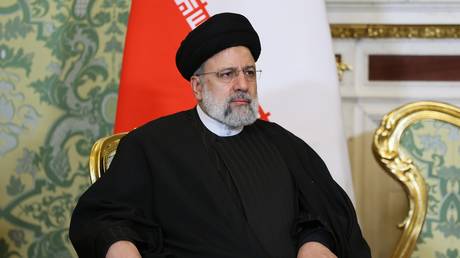 Helicopter carrying Iranian president crashes – reports
Helicopter carrying Iranian president crashes – reports
Iran’s political direction is primarily determined by the Supreme Leader, a role held by Ayatollah Ali Khamenei since 1989. While his official duty is to uphold the spiritual, cultural, and religious traditions of the Islamic Republic, in reality, he is a key political figure who often mediates between the various factions within the country, balancing the interests of the clergy and the IRGC leadership.
The death of the president, while significant, does not equate to the loss of the head of state, and thus Iran’s policies are unlikely to change in the near future. Although the president has influence and status, the final say rests with Khamenei.
Raisi had managed to gain Khamenei’s ear and was even rumored to be considered as a successor to the 85-year-old Ayatollah, though this was complicated by internal political debates and disagreements.
The death of Raisi is indeed a stress test for the system, given his considerable support within Iran. However, it is not expected to impact the overall power structure or the country’s trajectory. The key task will be overcoming the emotional impact of his loss while maintaining continuity in governance.
Categories: News, Non-Catholic
Assange wins right to appeal in US extradition case
The UK High Court has ruled that the WikiLeaks founder has the right to a full appeal process
London’s High Court has granted jailed WikiLeaks founder Julian Assange the right to a fresh appeal against a previous ruling that had ordered his extradition to the US.
The founder of the transparency website claims his prosecution in the UK is part of a larger Western effort to punish him for publishing leaked classified materials exposing alleged war crimes by the US and its allies.
If handed over to the US, he would likely be kept in isolation for the rest of his life, his supporters fear.
Assange has been in British custody since April 2019, when Ecuador revoked his political asylum and allowed police to arrest him at its embassy in London. Assange has since been kept in a maximum security prison fighting the extradition request from the US. The American case against the publisher was revealed only after he was arrested in the UK.
Read more US promises not to execute Assange – reports
US promises not to execute Assange – reports
American lawyers fought a legal battle against Assange in UK courts, securing London’s consent to hand him over in June 2022, when then-Home Secretary Priti Patel authorized the transfer. The WikiLeaks publisher's defense team has since been trying to overturn the outcome through several appeals.
In March, the High Court ruled there was merit in the argument that the 52-year-old’s rights may be infringed upon in the US prison system. Washington, in response, reportedly offered additional assurances to treat Assange fairly.
On Monday, Assange’s defense team argued that pledges given by the administration of President Joe Biden were “blatantly inadequate,” considering the risk of the death penalty and the chances that they would not be able to maintain contact with their client.
In a short ruling, two senior judges said American submissions were not sufficient and granted Assange another chance to fend off Washington’s claims through the British court system.
The US has indicted Assange under the Espionage Act, a law that is notoriously used by the American government to crack down on whistleblowers exposing classified materials. It does not allow defense on the grounds of public good. Assange stands accused of helping whistleblower Chelsea Manning in her 2010 disclosure to WikiLeaks of hundreds of thousands of classified and sensitive documents related to the wars in Iraq and Afghanistan, which the organization later made public.
Categories: News, Non-Catholic
ICC chief prosecutor seeks arrest warrants for Netanyahu and Hamas leaders
Israel’s PM and defense minister as well as Hamas leaders, are suspected of committing war crimes, Karim Khan has said
The chief prosecutor of the International Criminal Court has said he's seeking arrest warrants for Israeli and Hamas leaders, including Israel’s Prime Minister Benjamin Netanyahu.
There are “reasonable grounds to believe” that the wanted persons are responsible for “war crimes and crimes against humanity” in Gaza and in Israel, Karim Khan outlined in a statement on Monday.
Along with Netanyahu, the prosecutor is looking to arrest Israeli Defense Minister Yoav Gallant. The wanted Hamas officials include the Palestinian armed group’s leader Yahya Sinwar, the commander of its military wing –al-Qassam Brigades – Mohammed Diab Ibrahim al-Masri, and the chief of Hamas’ Political Bureau Ismail Haniyeh, the prosecutor’s statement reads.
According to Khan, Netanyahu and Gallant are suspected of war crimes and crimes against humanity in Gaza such as intentional attacks on a civilian population, willful killing and causing of suffering, using starvation as a method of warfare, “extermination and/or murder” as well as other “inhumane acts.”
The wanted Hamas leaders allegedly “bear criminal responsibility” for murder, rape and other acts of sexual violence, and for taking hostages, torture and other “inhumane acts,” the prosecutor said.
#ICC Prosecutor @KarimKhanQC announces applications for arrest warrants in relation to Benjamin Netanyahu and Yoav Gallant in the context of the situation in the State of #Palestine ⤵️https://t.co/WqDZecXFZq pic.twitter.com/bxqLWc5M6u
— Int'l Criminal Court (@IntlCrimCourt) May 20, 2024On October 7, Hamas fighters carried out an incursion into Israel, which resulted in about 1,200 people being killed and 250 taken hostage. The Israeli government responded to the attack by launching a large-scale military operation in Gaza that is still ongoing. According to data from the Palestinian enclave’s health ministry, 35,456 have been killed and 79,476 others wounded as a result of Israel’s airstrikes and ground offensive.
Israel is not a member of the ICC and does not recognize the jurisdiction of the UN court, but the State of Palestine joined the organization in 2015. Once warrants against Netanyahu and Hamas leaders are issued, any of the court’s 124 member-states will be obliged to arrest them if they set foot on their territory.
Read more US lawmakers preparing sanctions against ICC over Israel – Axios
US lawmakers preparing sanctions against ICC over Israel – Axios
Benny Gantz, the centrist member of Israel’s three-person war cabinet, labeled the decision by Khan to seek arrest warrants against Netanyahu and Gallant as “a crime of historic proportions.” Israel is waging “one of the just wars fought in modern history” and drawing parallels between its top officials and Hamas leaders is “a deep distortion of justice and blatant moral bankruptcy,” he claimed in a statement.
The country’s far-right finance minister, Bezalel Smotrich said that “we have not seen such a show of hypocrisy and hatred of Jews like that displayed by the court in the Hague since Nazi propaganda.” Another rightist cabinet member, national security minister Itamar Ben-Gvir, has urged the Israeli PM and defense minister to “ignore the anti-Semitic prosecutor and order a stepped-up assault against Hamas until they are completely destroyed.”
Back in April, when reports of a possible arrest warrant against Netanyahu emerged, the PM blamed the ICC for seeking to “paralyze Israel’s very ability to defend itself,” while fanning the “fires of anti-Semitism.”
Axios reported earlier this month that a group of Republican lawmakers in the US House of Representatives had been devising sanctions against the ICC in a bid to deter it from prosecuting the Israeli leaders. The US, Israel’s major ally, is not a state party to the Rome Statute, which founded the ICC in 2002.
Categories: News, Non-Catholic
Assange wins right to appeal extradition to US: Live Updates
A British court has ruled that Washington’s assurances that the WikiLeaks founder would receive a fair trial are insufficient
The UK High Court ruled on Monday that imprisoned WikiLeaks founder Julian Assange can appeal a US extradition request. Washington has demanded that the editor be handed over to stand trial on espionage charges for his website’s coverage of America’s wars in Iraq and Afghanistan.
In a long-running legal battle, Assange’s lawyers have repeatedly attempted to appeal the extradition request, arguing that the 52-year-old would not be given a fair trial in the US and could potentially be sentenced to death.
In response, Washington has issued diplomatic assurances that Assange would not be held in a maximum security prison or be put into solitary confinement for extensive periods of time, would not face the death penalty, and would be guaranteed a First Amendment right to free speech.
However, British judges ruled on Monday that these assurances were insufficient and allowed Assange’s legal team to proceed with their appeal against the extradition request.
This live stream has ended.
Categories: News, Non-Catholic


